
World history: Hundreds of ancient settlements discovered in Great Britain
The presence of long past civilisations is being uncovered in amazing detail thanks to the exceptionally dry early summer weather in the south of British Islands. Throughout the summer, hundreds of cropmark sites from Neolithic long barrows to World War II military remains have been recorded from the air by English Heritage Foundation.
Among the most valuable discoveries – Neolithic tombs, prehistoric settlements, forts and camps of Roman legionaries.Flights over the East Riding have proved especially productive with around 60 new sites being found in just one day. Mainly prehistoric, they included livestock and settlement enclosures, field systems and trackways.
According to the official representative of the Foundation “discoveries were made on the basis of analysis of materials of daily aerial photography from Cessnas airplanes.
According to him, the vegetation that covered the ancient buildings "faded more than the usual soil, and land has bared a little, revealing the objects of research”..
One of the most interesting discoveries was a Roman camp in Dorset – a lightly built defensive enclosure that provided basic protection for Roman soldiers while on manoeuvres in the first century AD. It is relatively rare in the south west of England with only three others known in the region.
Many known sites were also photographed revealing impressive new detail, including Newton Kyme, near Tadcaster, North Yorkshire such as the rectangular Roman fort dating back nearly 2,000 years.

